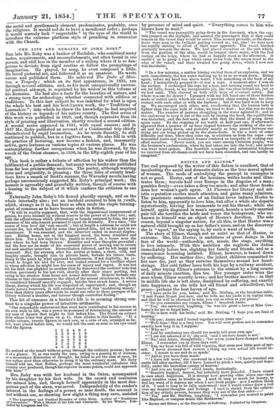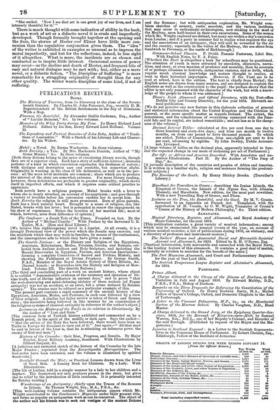HESTER AND ELINOR. * THE end proposed by the writer of
this fiction is excellent, that of inculcating the social and domestic duties as the true moral sphere
of woman. The mode of embodying the precept in examples is not so good. Hester, oat of the heroines, writes books and illus- trates them; travels half over Europe in the disguise of a man; gambles freely—even takes a drop too much; and after these freaks dons her woman's garb again. At Florence her literary and art- istic reputation excites much attention and gains many admirers. The passionate earnestness of an Italian lover induces Hester to listen to him, apparently to love him, but after a while she departs mysteriously, leaving her inamorato to cut his throat; while she herself, again disguised in man's apparel, haunts a newly-married pair till she terrifies the bride and vexes the bridegroom, who un- known to himself was an object of Hester's devotion. The sole reason, beyond a singular nature, for all this, is that Hester was a natural child brought up as her father's niece, and on the discovery she is " upset," as the saying is, by such a want of truth. The story of Elinor, though not so outré as that of Hester, is extreme. She, like Hester, is ambitious of great doings in the face of the world—authorship, art, music, the stage, anything to live intensely. With this ambition she neglects the duties immediately before her, slighting her family and friends, and as a
consequence becoming isolated. Elinor, however, is tamed down
by suffering. Her mother dies ; the infant children committed to her care die, just as they entwine themselves around her heart- strings. Her cold father loses both his legs by a railway accident, and, after trying Elinor's patience to the utmost by a long course of daily minute exaction, dies too. Her younger sister wins the man whom Elinor secretly loves ; and her brother monies : so that in middle life she is left alone, disciplined by suffering, not exactly into happiness, as she tells her old friend and schoolfellow, but peace—perhaps the best haven of age.
"'I have news for you ladies,' said Mr. Stirling, at the breakfast-table. met Frank Stuart Just now, and he tells me his yacht is in capital trim, and that he will be charmed to take you out as often as you please.'
" Do you remember my cousin, Elinor ? ' inquired Annie. " Yes,' she answered, laughing, he was too great a hero at Miss Gra- hame's for me to forget him.' "'He is here with his bride,' said Mr. Stirling. 'I hope you are fond of boating.' " Oh yes ; Annie and I boated together seven years ago.'
"'Well done! that is a long time. You will soon profess not to remember exactly hho long it is, I suppose.'
" W so ? '
" ' Lesty wby confessing you should too nearly tell your own age.'
" I am not ashamed of it,' she said, ' and I am sure Annie is not " No,' said Annie, thoughtfully ; ' but seven years have changed us both, Elinor. I remember you in those days well.'
" Yes, my head was full of wild vagaries, that seem now little part of my- self. I never dreamed how earnest a thing my own actual life would be- come. I meant to see and do so much.'
" ' And so you have done much.' " I have felt more,' she answered in a low voice. ' I have watched one castle fall after another, till I have learned to pitch a tent, quietly and hope- fully, under the boundless canopy of heaven.' " And you are happier ? ' asked Annie, hesitatingly.
"'Scarcely happier, dearest, but infinitely more peaceful. I have ceased to care about happiness. It is strange how growing older alters one—how many troubles cease to trouble us. I used to long so much for beauty, to feel m3, want of it depress me when I saw fresh people : now I seldom think of it. I used to long to be fully understood : now I would rather draw a veil over my deepest thoughts and feelings. I used to shrink from the cultiva- tion of my artistic powers, because they were not of the first order—' " ' Yes,' said Mr. Stirling, laughing; 'I remember you wanted to paint like Raphael, or compose music like Beethoven.'
• Hester and Elinor ; or the Discipline of Suffering, Published by Chapman. "She smiled. 'Now I see that art is one great joy of our lives, and I am intensely thankful for it.'"
There is much thought with some indication of ability in the book, but as a work of art or a didactic novel it is crude and imperfectly developed. Though formally brought together at the opening and the finis, the stories of Hester and Elinor have little more con- nexion than the copulative conjunction gives them. The "idea" of the writer is exhibited in examples so unusual as to impress the moral imperfectly, and but for the reflections, indeed, to lose sight of it altogether. What is more, the incidents are so chosen and conducted as to inspire little interest. Occasional scenes of power may occur—as the decline and death of Hester, and frequent bits of easy and natural dialogue may be met with ; but, either as a mere novel, or a didactic fiction, "The Discipline of Suffering" is more remarkable for a struggling originality of thought than for any other quality. The writer wants discipline of some kind, if not of suffering.



































 Previous page
Previous page